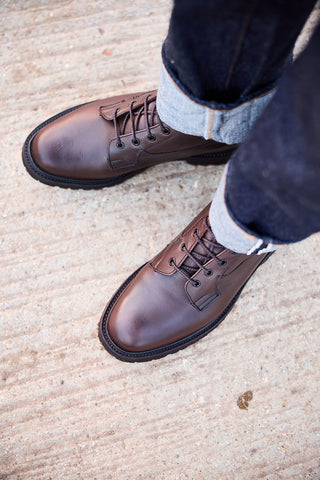
PG: Well, it's great to welcome you here to Cookson and Clegg in sunny Blackburn nice to get to show you where I work for once having been to your wonderful factory several times
PG: I have a few pairs of your shoes; I think I have five pairs of your shoes
MM: We both sort of share this sort of passion for manufacturing in the UK obviously Tricker's has been around for nearly 200 years and still making things in the way that we always have done.
PG: Well, it's always lovely to see your place and see you know to see something go from a flat sheet of leather to a beautiful pair of shoes at the end of it.
MM: There’s not many of us left in Northampton that are still making 100%. People that buy Trickers buy it as an investment. They really treasure them. There are 260 individual processes, jobs bits being done to those shoes and might look a lot of money to a lot of people to invest in up front, but they will literally last you a lifetime.
MM: We have a finite number of shoes we can make our production line is very limited to either the size of the factory the number of operatives that we've got.
PG: We've been in Blackburn since 1860 so we're not we're no spring chickens. Around 70% of the world's cotton textiles were made within 30-40 miles of here which is an incredible thing and about 600 000 people were employed in textile manufacturing in this county alone. All the things that we're thinking and talking about doing to make our industry more sustainable and more ethical are all really things that were done until 40-50 years ago as a matter of course.

PG: Everybody fixed their clothes everybody used natural materials everybody made things to last and I think the big challenge for me as somebody in the clothing industry is to try and spread this message that you can buy fewer things but buy better things and make sure that those things last and if you can do that you can feel very proud of the way you kind of treat the planet in terms of the clothing that you own.
PG: We haven't been very good at this we've accepted mediocrity in the products that we buy a lot of people have.
PG: I think a lot of people don't even know how mediocre the things they are buying are because they've never had the opportunity to wear something that's of real quality. I think a lot of people growing up now will only ever have worn polyester clothes they will only ever have worn shoes that are glued together and made out of polyurethane. They would never know how amazing it feels to have something that gets better and better every time you wear it and I think that's really sad.
PG: There are clearly people who are changing large parts of the way they live in order to try and protect the planet, but those same people are still shopping with fast fashion brands who are paying lip service.
PG: There's a lot of greenwashing in the world of clothing right now but I don't think there is any doubt in my mind that the direction of travel is towards consuming less, consuming only better things and that is because we are all aware that the planet, we live on is under threat. We are living in a climate emergency and if we don't change our habits, we will wreck the planet for good.
PG: I would rather have a tiny handful of incredibly precious things that were beautifully made and got better and better with age. I've got clothes that were my dad's, I've got clothes that were my grandad's, they're really precious because I know that they lived in these things and again I think that adds value to the things we own.
PG: These shoes took time to wear in you know they've developed character by the wear that they've had from me.
MM: Everyone seems to have been pulling their old shoes out of the wardrobes, our repair service is actually busier than it's ever been.
PG: Well, I guess maybe people have got time to think about these things.
MM: Time to value what they've got.
PG: Time to take stock.
MM: We get them incredibly damaged, the dog's got hold of them ripped it to bits, somehow, they're thinking "how the hell can we fix that?" but they do find a way of fixing it.
MM: The goodyear welting process is designed so that they can be easily resoled and re-healed.
PG: New soles as these ones have. Indeed yeah.
PG: I think they've been re-soled once. That's equally as important to us as selling new pairs.
PG: Repairing feels to me like an act of kindness to the planet, every time you fix something you are reducing the number of new things that need to be made and that's a really wonderful and powerful thing that we can all do and also every time you fix something it to me becomes more valuable. I have more investment in this thing, and I do fix things myself. I darn my sweaters I patch things and every time I go through that process I love the thing more, but you can't fix things that aren't made well.
PG: Just like your shoes, our clothes are made in a way that they can be disassembled and put back together and be just as good as they were at the very beginning.
PG: People feel trapped in this cycle of buying cheap disposable things because they don't feel like they can take that step and that was what we tried to do with Community Clothing was to try and find a way of making really high quality locally made clothes that support good jobs in these communities and make it affordable to people because it's still relative to the very cheap brands it's still relatively expensive. We say in our adverts our things are affordable, but people say well you know 35 pounds for a sweatshirt isn't affordable I can buy one for 20 quid, I said well yeah you can but question what's gone into it and question who's been paid what to make it.
MM: We need to show people more about what it is that goes on inside our factory it's also really important we attract younger and excited individuals into this business, whether it's making textiles here in Lancashire whether it's making footwear in Northampton you know it's a fantastic industry to learn it's a trade and they actually are making something of value, something that will be worn by people all over the world.
PG: Northampton is a shoe town; Blackburn is a cotton town that sense of identity is important to people too and I am convinced that people who come and learn to make something will feel happier and more satisfied with their life than those people who go to work every day and pick products out of a basket for an online retailer.
PG: I think there are a lot of young people who are very committed to living in a way that is positive for the planet. We have to go back to a way of life where we see the things we buy as things we ought to keep and cherish and I feel like that is that is starting to happen, but we've got a long way to go yet.
MM: I think if people you know pay a little bit more, the most that they can afford and buy something that has been made well, i.e., a pair of shoes from Northamptonshire and clothes that you make here in Lancashire, they'll treasure them, keep them and they'll become items that they'll really love.
PG: Yeah, buy fewer things and buy good things and keep them and cherish them and repair them and that the solution.


